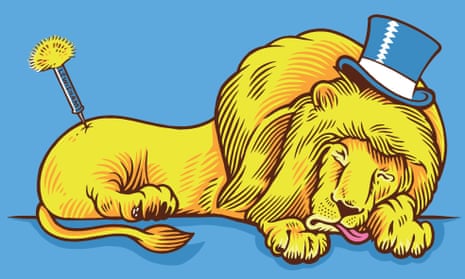Bermondsey, Millwall’s south London home patch for the past 106 years, has been called many things in its time. “London’s larder” was one hopeful piece of rebranding, tribute to its many tinned food factories. “Biscuit town” came and went, legacy of the Peek Freans boom years, when the world’s combined Garibaldi reserves were supplied by London’s most unloved peninsula. Even snappier, although not often mentioned by local estate agents, was “Target Area G”, the Luftwaffe’s name for Bermondsey and surrounding areas during the nine-month firestorm of the blitz.
Miraculously the Den escaped the bombings untouched right up until April 1943, when it was all but destroyed in a raid. Millwall’s manager, Bill Voisey, sitting up late in his office, survived a direct hit, although his injuries meant he was succeeded by the legendarily debonair Jack Cock, England footballer, war hero, popular singer and star of the films The Winning Goal and The Great Game.
It is a very Millwall, very south-Bermondsey-cum-New-Cross-wilderness kind of story; a place that seems to have spent most of the past 500 years since Henry VIII demolished on a whim its only monastery, being unwanted, unloved and generally shot to bits.
These same qualities of resilience may be needed again after the decision this week by Lewisham’s Labour council to approve plans for compulsory purchase of land around the Den as part of a mass “regeneration” project. Millwall currently rent the land under threat, the loss of which could threaten the club’s basic operations. They offered to buy it at a higher price. Lewisham chose to go with the developer Renewal, which is ultimately controlled by offshore companies with mysterious owners and whose plan involves shoehorning in 2,400 homes, the huge majority for private sale, as part of Boris Johnson’s ramped-up “New Bermondsey” vision.
The end result of which is more of the same old, same old. Target Area G is once more in the crosshairs. The Den is again under attack. As indeed, more broadly, is football itself, or at least its fogged and dwindling status as a force for community and collectivism, to be prized and valued beyond the annihilating simplicities of the market.
This was probably always coming. From the outside, Bermondsey has always felt like an oddly abandoned place, hard to get to, hard to get out of, a hidden corner of outer-inner London jutting out into the southern bend of the Thames. Wealth and work have tended to dribble away, first the leather industry, then the food factories and finally the docks.
Millwall have at least stuck around, a marmalade and jam works team from the Isle of Dogs shifted up river and settled on Cold Blow Lane. It has been a febrile existence, right from the first dockers’ derby with West Ham, during which the East Ham Echo noted “all attempts at football were ignored”, culminating in West Ham’s Jarvis inflicting serious injury by smashing the head of Millwall’s Deans against a metal advertising board.
A period of success in the late 1960s was followed by the closure of the docks and an increased sense of inner-city alienation. The hand grenade chucked on to the pitch from the away end at Griffin Park may have been a harmless replica, but for two decades the Den attracted some genuinely frightening people. A huge amount of work has gone into tackling racism in the ground. But this was for many years a place where something curdled and scabbed did occasionally erupt into view. Football cannot solve these problems. It does at least try.
This is all a part of the current story. New Bermondsey. We get the idea. Time to flush out and rebrand. Revenue streams must be wrung, the light let in. The developers’ plan is, quite literally, to “clad” the Den, to make it look new from the outside, the architectural equivalent of slapping a new hat on grandma’s head and wheeling her off into the corner because the posh in-laws are coming round.
And yet, industry loyalties aside, there are some serious problems with what Lewisham and its developer are proposing to do. For a start, the plans to create a “new community” overlook the fact Bermondsey already has a community, one that has been flourishing, quietly, with help from Millwall themselves.
This is not simply a local leisure service provider. Football clubs do not relocate when times are thin (unless they are MK Dons). They stick it out and engage. London’s hunger for space may have finally touched the Den. But the club believes it has the right not to be edged out, but to play a role in the regeneration of the area. Instead it finds itself ushered to one side by a local authority that has little historic interest in sport of any kind, whose boundaries end a tantalising 500 metres west, and whose inhabitants have often been supported by the club’s own community initiatives.
Three years ago Millwall sent their players out to join the (successful) campaign to save Lewisham hospital A&E department, a triumph that offered plenty of political capital to the same officials now selling their land from under their feet. The Millwall Community Trust has also been out there going above and beyond, offering education and opportunities, helping young offenders and kids with learning difficulties. By way of thanks the Trust will now be evicted when the compulsory purchase order goes through. Lewisham council has a motto: Salus Populi Suprema Lex, or “The welfare of the people is the highest law”. Words, huh.
Millwall have offered to put forward their own regeneration scheme with the club at its heart. Instead Lewisham chose to partner with a developer whose ultimate parents are offshore companies owned by mysterious entities including a family trust. There is no evidence Renewal has ever carried out a major development project. It has no interests in the area.
What the council’s decision seems to say is that there are communities and then there are communities. A rising tide lifts all boats and Bermondsey is on the up. Just two miles from the Den they are still trying to sell the £50m penthouses of the glass and steel sky city, floors 53-65 of the Shard. Canary Wharf is just over the river, clearing house for transient global billions. The Rotherhithe peninsula sits crunched between the two. Welcome, then, New Bermondsey, heir to Biscuit town, Target Area G, and plain old Bermondsey. Let them come. Like Bill Voisey, Millwall will walk out of this bloodied but still alive, close-up witnesses to another digging down into the question of what value can be placed on unmonetised community, the ties that have bound an area like SE16; and beyond that the continuing, largely incidental question of what football clubs are really for these days.

